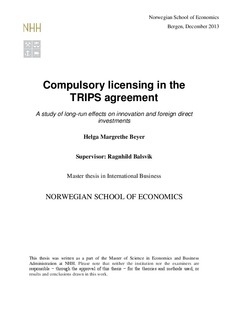Compulsory licensing in the TRIPS agreement : a study of long-run effects on innovation and foreign direct investments
Master thesis
Permanent lenke
http://hdl.handle.net/11250/193424Utgivelsesdato
2013Metadata
Vis full innførselSamlinger
- Master Thesis [4372]
Sammendrag
The aim of this thesis is to provide an insight into the potential effects that follow the use of compulsory licensing in developing countries. Compulsory licensing is implemented in World Trade Organization’s agreement of trade related aspects of intellectual property rights (TRIPS) and attempts to strike a balance between creating access to existing drugs and promoting the research and development of new ones. Pharmaceutical patent holders argue that this measure will reduce their incentive to provide the world with future needed drugs. Humanitarian organizations along with the developing world underline the importance of compulsory licensing as a measure to secure life-saving medicines to people who otherwise would not afford them. Thus, depending on whose perspective one takes, compulsory licensing could be viewed as either a harmful or beneficial policy measure. One might also see possible effects on the level of innovation within the countries that use the compulsory license, as the license may provide knowledge transfer that motivates innovation. A negative effect, however, could be possible sanctions in foreign direct investments as a response to the use of compulsory licensing. The amount of empirical literature trying to investigate these effects is scarce. Most compulsory licenses issued through the TRIPS agreement are on HIV/AIDS drugs. Further, there is a possibility that depending on different characteristics of the country issuing the compulsory license, the effects on innovation and foreign direct investments may vary. Such characteristics could be national policies in the country, importance of their market for the rights holder and characteristics belonging to the patented drug. These characteristics should be considered implemented in future research.
